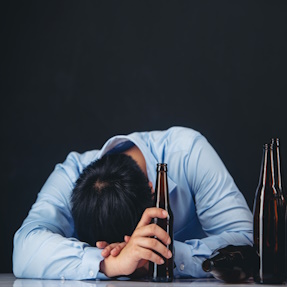
Why overconsumption of alcohol negatively impacts your liver, bladder, and sexual health
Drinking alcohol can be enjoyable, but excessive consumption can negatively impact your bladder, liver, and sexual health. It’s essential to be mindful of how much you drink to avoid any potential health issues.
ALCOHOL AND YOUR BLADDER
Consuming alcohol can result in higher urine production and water loss through urine. This is because alcohol acts as a diuretic and suppresses the hormone that controls water excretion. As a result, dehydration and more concentrated urine may occur, which can irritate and inflame the bladder lining. This can raise the chances of getting urinary tract infections, among other ways alcohol can harm the bladder’s health.
OVERACTIVE BLADDER
Drinking alcohol can worsen an overactive bladder or urinary incontinence due to its irritating effect on the bladder.
INCONTINENCE
Holding large quantities of concentrated urine for prolonged periods can weaken your bladder, ultimately causing urine to leak.
ALCOHOL AND YOUR LIVER
Your liver is an essential organ in your body. It produces bile to aid in digestion, removes waste, breaks down fats, produces substances that aid in blood clotting, stores sugar for energy, and detoxifies harmful substances.
One of the liver’s enzymes, alcohol dehydrogenase (ADH), metabolizes alcohol. However, every time the liver breaks down alcohol, it releases toxins that can harm or kill liver cells. While the liver can create new cells, excessive alcohol consumption over time can hinder regeneration. This can lead to liver disease and severe, permanent liver damage.
Three types of liver damage can be caused by excessive alcohol consumption:
ALCOHOLIC FATTY LIVER DISEASE OR STEATOHEPATITIS
As the liver processes alcohol, it creates a harmful substance that can damage your liver cells. This can lead to inflammation, weaken your body’s natural defenses, and eventually cause fatty liver disease.
ALCOHOL-INDUCED HEPATITIS
When someone consumes alcohol regularly, their body accumulates an excess of fat and toxins. If the liver cannot process these substances, the fat builds up and causes permanent inflammation. Liver cell death can result from this, which is known as alcohol-induced hepatitis – the second stage of alcohol-related liver disease.
CIRRHOSIS
Excessive alcohol use or infection can cause damage to your liver, leading to the development of scar tissue. This scar tissue eventually accumulates and replaces most of your liver cells. This can cause your liver to malfunction, and unfortunately, it is usually irreversible.
ALCOHOL AND YOUR SEXUAL HEALTH
Consuming alcohol is a depressant that can slow down the central nervous system and lead to dehydration, both of which can be possible factors adversely affecting your sexual health.
ERECTILE DYSFUNCTION
Consuming excessive alcohol can result in erectile dysfunction, which impairs a man’s ability to achieve or maintain an erection. When aroused, your brain signals your penis to fill with blood and become erect. However, excessive alcohol consumption can slow down your brain’s functions, causing delays or even failure in transmitting those signals.
DEHYDRATION
Alcohol is a diuretic that can decrease blood volume and restrict circulation in your body. Reduced blood flow can occur, making it difficult to achieve an erection. Additionally, alcohol can cause dehydration, increasing the level of angiotensin hormone in your body. The constriction of blood vessels caused by this hormone can contribute to erectile dysfunction by decreasing circulation.
REDUCED DESIRE AND AROUSAL
Both men and women, when consuming alcohol, may notice a reduction in sexual desire, resulting in less intense or delayed orgasms. Women’s arousal also depends on good blood circulation, and alcohol can impair this, making arousal or achieving an orgasm more complex.
Dr. David Samadi is the Director of Men’s Health and Urologic Oncology at St. Francis Hospital in Long Island. He’s a renowned and highly successful board certified Urologic Oncologist Expert and Robotic Surgeon in New York City, regarded as one of the leading prostate surgeons in the U.S., with a vast expertise in prostate cancer treatment and Robotic-Assisted Laparoscopic Prostatectomy. Dr. Samadi is also the author of The Ultimate MANual, Dr. Samadi’s Guide to Men’s Health and Wellness, available online both on Amazon and Barnes & Noble. Visit Dr. Samadi’s websites at robotic oncology and prostate cancer 911.
